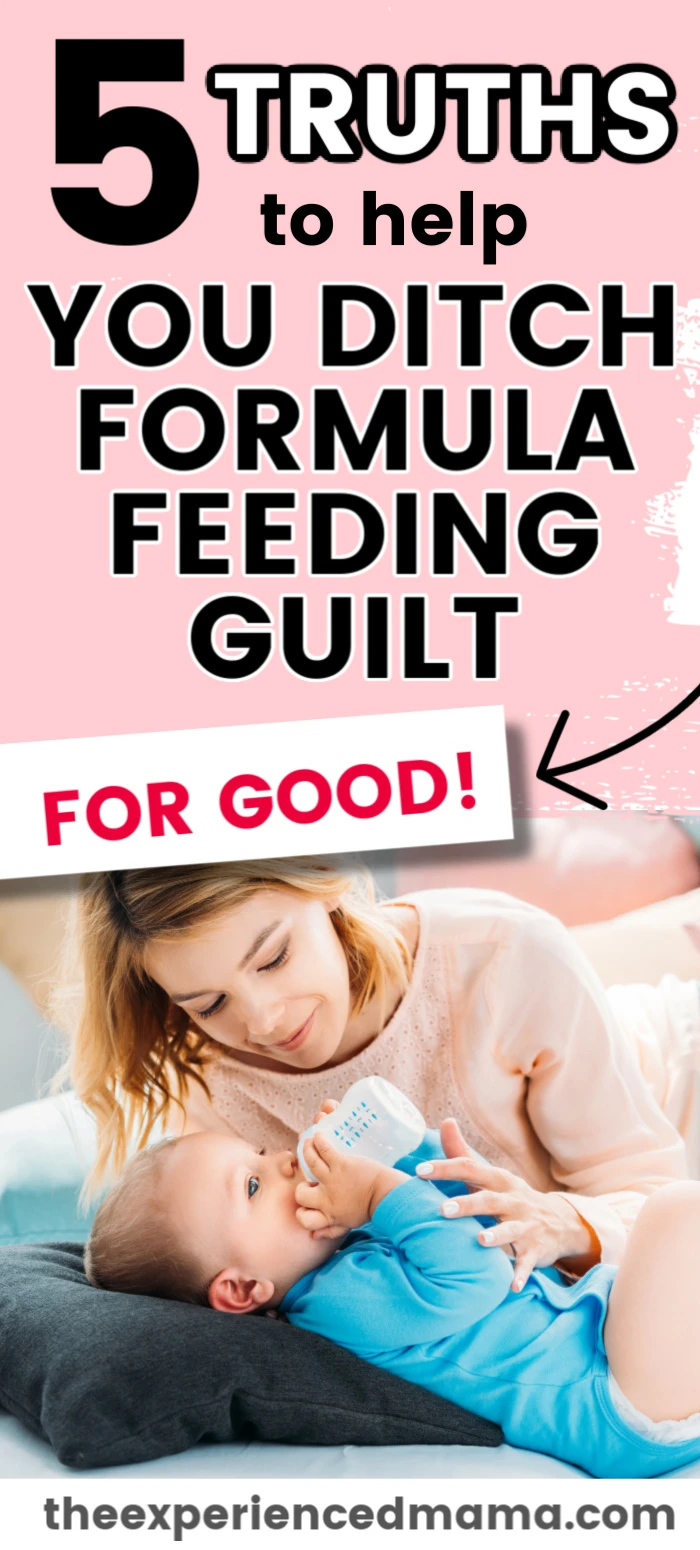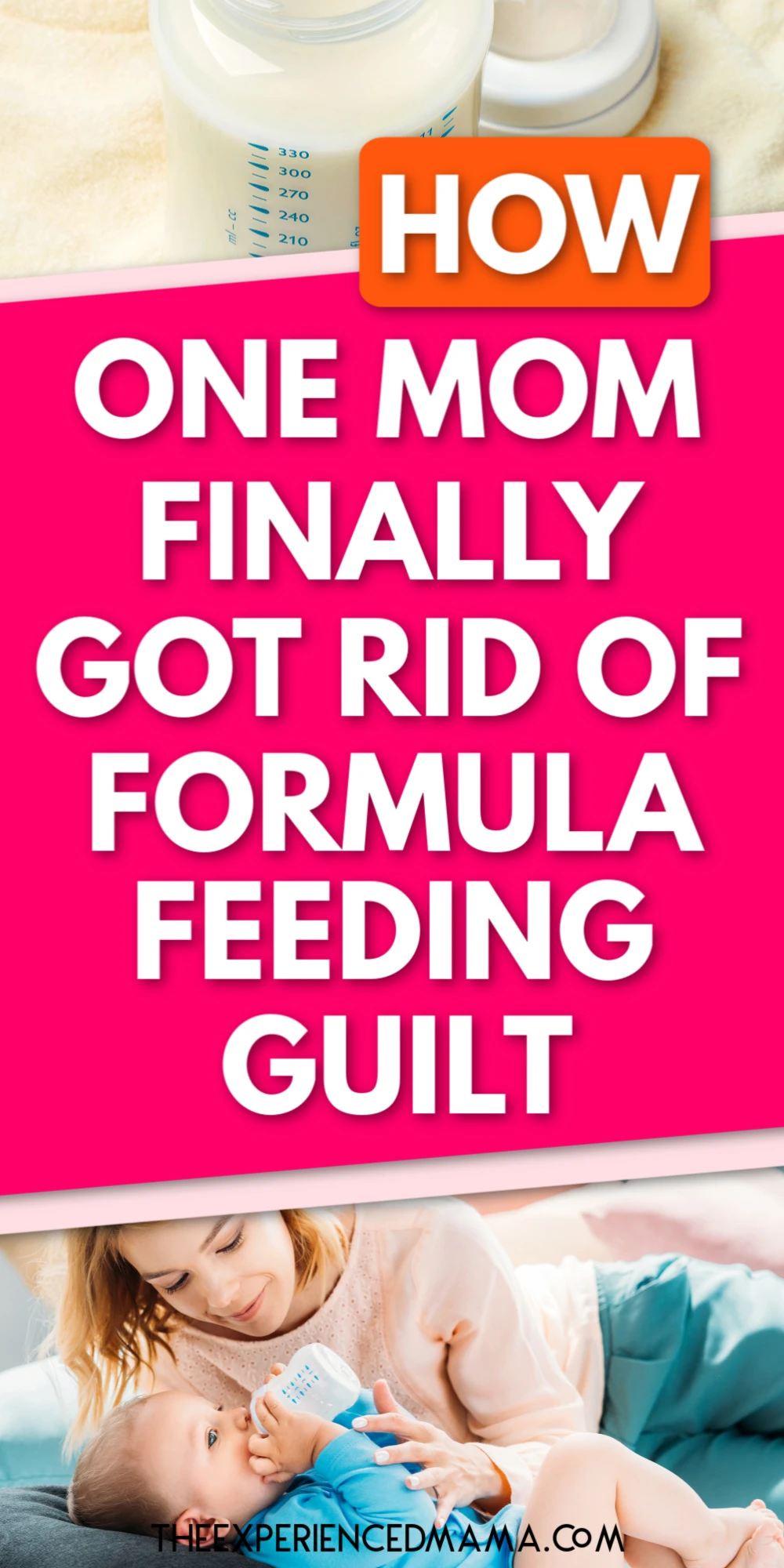Inside: Five truths you need to hear to finally let go of formula feeding guilt. Also read one mom’s personal experience – her rocky journey to formula feeding and what helped her to finally accept and believe (not just know) that fed really is best.
When I had my first baby in 2009, breastfeeding was most definitely IN.
All the classes seemed to assume that breastfeeding would automatically work out, and no one really talked about the alternative – formula.
But talking to my mom one day about her experiences with breastfeeding, I realized how much things have changed since she was a brand new mom.
When SHE was giving birth and talking feeding choices, formula was still popular, and breastfeeding was only beginning to make a comeback.
In the 1960s, just a decade before my mom had her first baby, only about 20% of moms breastfed (source). TWENTY PERCENT.
Back then? Moms probably felt “breastfeeding guilt” NOT formula feeding guilt.
You would think that nearly sixty years later, we would have made some progress on the guilt front. Nope – in fact, it’s only getting worse.
In an age where we are flooded with information every day, we question our parenting choices all the time about pretty much everything, not just formula feeding.
What we feed our kids from birth on up, where they sleep, how much TV we let them watch, how we handle tantrums. It feels like it’s all under public scrutiny.
But you don’t have to succumb to formula feeding guilt, or any other kind of mommy guilt.
Use these five truths and one mom’s personal journey to full-time formula feeding to help you ditch the guilt – for GOOD.
Related: 12 Legitimate Reasons to Stop Breastfeeding Guilt-Free

5 Truths to Remember When Formula Feeding Guilt Won’t Let Up
THIS POST PROBABLY CONTAINS AFFILIATE LINKS. IF YOU LIKE LEGAL JARGON, YOU CAN READ OUR FULL DISCLOSURE POLICY HERE.
1. Your baby is not a statistic, and neither are you.
When you read the statistics about formula fed babies, it’s tempting to question your choice to formula feed, or despair because you had no other choice. Reading those studies can lead you to believe that because you couldn’t breastfeed, your baby is doomed to anything from an extra dose of sickness her first year or obesity later in life.
But your baby is not a statistic, and neither are you.
You have about a million other choices to make as a parent besides breastfeeding versus formula feeding.
All of those choices have the potential to positively influence your baby’s health just as much, if not more so than whether or not you choose to formula feed.
Let the formula feeding guilt go, and focus on the hundreds of other things you can control, instead.
2. Sixty years ago, formula feeding was popular, and breastfeeding tolerated, if not discouraged.
Trends in medicine and parenting can change overnight.
For example, for decades we weren’t supposed to feed our kids peanuts until they were at least a year old. Then last year, all the pediatricians decided that no, what they had told us all for years actually INCREASED the likelihood that our kids would develop peanut allergies.
Wonderful.
So now we all feed our kids peanut butter at six-months-old in hospital parking lots, hoping against hope that they won’t need the epipen that we don’t have on hand.
For years, we were told that co-sleeping was dangerous, borderline child abuse. But in light of the about-face pediatricians have made regarding peanuts, many parents are starting to question their advice about co-sleeping as well.
AAP cites seven studies to support its recommendation against bed-sharing.
But a close look at these studies — and an independent analysis from statisticians — reveals a different picture. And some researchers say it might be time for the U.S. to reassess its recommendation and its strategy to stop SIDS (source).”
Right now, it’s “back to sleep”, but when my mom was having babies? Pediatricians insisted on sleeping babies on their sides, so they wouldn’t choke on their spit up.
Sixty years ago, formula feeding was pushed, even encouraged. Only 20% of moms breastfed.
Today, breastfeeding is pushed from every angle, sometimes to the detriment of the mother. To the point of making moms feel badly when they have to (or choose to) use formula.
Almost every parenting choice has had a turn in the spotlight. Don’t let what’s trending NOW make you doubt your choices that happen to be different.
3. You don’t need to defend your choices, your circumstances, your truth – and especially not to strangers.
You know your own circumstances better than anyone else. You know why are formula feeding and not breastfeeding.
Maybe you didn’t have enough supply, no matter what you did to increase it.
Maybe you had to go back to work full-time, which is hard enough, but the thought of pumping every two hours made it feel impossible.
Maybe your baby is allergic to just about anything you could possibly consume that’s actually worth eating, making breastfeeding feel like a prison.
Or maybe, just maybe, you didn’t want to breastfeed. And that’s valid, too.
What’s crazy about our society is so many of us feel like we need to defend our choices…to strangers on the internet – on social media. We waste so much energy defending our choices to people who don’t matter at all, and don’t deserve an explanation.
You don’t have to take abuse for your parenting decisions on social media.
You can:
- Block your Facebook Feed, and go directly to the group or page you need information from.
- Unfriend or unfollow people who are cruel on social media (even if they’re family).
- Only stay in Facebook groups with active admins with a no tolerance for bullying policy.
You made a choice to formula feed – or the choice was taken out of your hands and made for you – and no one is entitled to an explanation or a defense of that choice.
So stop defending, and stop explaining. Save your energy for the people and the things that matter.
Related: Feeling Judged for Formula Feeding? Here Are 5 Practical Things You Can Do in Response
4. Being your baby’s mom – with or without breastfeeding – is more than enough.
I made vastly different parenting choices with my last two babies than I did with my first three.
Unfortunately, I was sold on the Babywise method with my first baby and spent many nights trying to get her to sleep through the night. I didn’t cosleep with my first three – in fact, I spent several years trying to get them to stay in their beds.
With my last two I did it all different – cosleeping, extended breastfeeding, gentle parenting. Quite the contrast.
I wrestled with guilt for a long time. Why couldn’t I be the parent I am now with my first three? Why couldn’t I give them the same experiences my last two are having?
But eventually I realized something: my kids don’t hold it against me in the slightest.
When your baby is 5 or 10, she isn’t going to hold it against you that you didn’t breastfeed her. All she’s going to care about is that you’re her mom, and that you’re there for her right now.
Your baby just wants to be snuggled and changed and fed.
She’s perfectly content if those three needs are met, and she isn’t holding it against you in the slightest that you’re not breastfeeding her for whatever reason.
5. It’s o.k. and healthy to grieve breastfeeding.
Maybe you really hoped to breastfeed. You dreamed for months of the closeness that comes with it.
Maybe all your friends breastfeed, and you feel utterly alone in formula feeding.
Losing your dream and feeling alone? They can both be really hard as a new mom.
When I had my first baby, I wanted a natural, unmedicated birth. What I got? An epidural and a c-section.
I needed to grieve in order to let go of the guilt and to accept what I knew to be true – that my baby and I were both safe and healthy, and that was all that mattered.
I cried a LOT, talked to other moms who had gone through the same thing, and then I wiped away my tears and moved forward.
You need to know that it’s o.k. to grieve. It’s not just o.k., it’s probably necessary.
Accepting your new reality, the one you didn’t imagine or necessarily want is a good thing, but often you have to grieve BEFORE you can accept and move on.
Related: 5 Tips for Formula Feeding on the Go You Need To Read ASAP

How One Mom Finally Let Go of Formula Feeding Guilt
Mary Ann Blair from MaryAnnBlair.com is back to talk about how she finally managed to ditch formula feeding guilt for good! This is her story.
These days, the phrase “breast is best” is said over and over again to newly pregnant moms. After hearing it enough times, breastfeeding became something I knew I was “supposed” to do as a new mom.
I felt confident that if I read a book or two, went to a lactation class, and just allowed my body to do what it was made to do, I would have a successful breastfeeding experience.
Then my son was born, and reality came crashing in.
The first week was kind of a mess. Through gritted teeth and tears, I pushed through each feeding session as my nipples grew more and more sore and raw.
I’d heard that the early weeks could be rough and held onto to hope, believing that this was just a normal part of the process.
But then, at an early appointment with our pediatrician, we learned he wasn’t gaining weight quickly enough. The pediatrician shoved a bottle of formula at me and said, “Feed him!”.
As I watched my son gulp it down hungrily, I experienced my first sense of failure as a mom. I wasn’t able to give him what he needed.
And the formula feeding guilt started to creep into my heart and mind.
Days of Supplementing with Formula Turned into Weeks
As the weeks went by, we continued to struggle. My supply was extremely low, and I had to continue to supplement with formula.
I sought help from a lactation consultant, and she gave me a medication to help increase my supply. That medication put me on an emotional rollercoaster, but I was determined to do whatever I had to do to breastfeed.
After a few visits with her, it was discovered my son had a rare tongue tie that was interfering with his latch. She encouraged me to pump as much as I could, so in between feedings, I would pump throughout the night and day.
I was so sleep deprived I could hardly think straight.
When he was about a month old, my son started crying a few minutes into each nursing session. He was tested for a milk allergy, but those tests came back normal.
My guilt about having to supplement with formula continued to grow.
Around this time, I joined a mommy-baby group at our local hospital. All the other moms were breastfeeding.
As I dug my formula container out of the diaper bag, I felt like a complete failure. What was wrong with me? What was wrong with my body?
Why couldn’t I give my son the nourishment he needed?
The Words That Helped Me Embrace Full-time Formula Feeding
When my son was a few months old, a friend came to visit. As I handed her a bottle of formula, there was no judgement in her eyes.
As I broke down in tears, she gave me the words I had so desperately needed to hear—“It is perfectly o.k. to switch to feeding formula full-time. You have to take care of you, too.”
With the support of my sisters, mom, and other friends, I decided I needed to let go of the dream of breastfeeding and exclusively formula feed.
It was honestly the best decision I could have made.
No longer having to pump around the clock meant I could sleep better at night. (And we all know how precious sleep is with a baby!) My body began to physically heal after months of painful nursing.
I could enjoy my baby more without the anxiety and stress surrounding breastfeeding. I was a happier mom and wife.
Even though it truly felt like the right decision, the formula feeding guilt still lingered.
I felt guilty every time I saw a baby happily snugged up to his mama’s breast.
I felt guilty about spending such a large chunk of our family’s grocery budget on formula.
I felt guilty that I had only nursed for 3 months, and had to supplement that entire time.
Forced to Formula Feed A Second Time – The Guilt Came Back
When my second son was born, I tried to breastfeed again. I was determined to have a better experience the second time around. But soon after he was born, the same supply issues began again.
I was once again encouraged to pump in between feedings, both night and day. But this time around, I was also trying to take care of my busy toddler.
I was physically and mentally exhausted. I made it to the 2-month mark, but had to supplement almost the entire time. Once again, feelings of failure and guilt reared their ugly heads.
When my youngest was a few months old, I learned that an underlying medical condition was most likely the culprit for my poor supply.
There were so many times I felt that if I had only tried a little harder, I would have been successful at breastfeeding. Having that diagnosis allowed me to let go of a lot of the guilt I had been hanging on to.
Related: The Benefits of Formula Feeding for Mom That I Needed to Hear
Formula Feeding Does NOT Make You a Bad Mom
After my postpartum experiences, I now believe in a different motto—”Fed is best.”
Whether you choose to formula feed from the start, or breastfeeding doesn’t work out, please take heart in the fact that as long as you love that baby as best you can, then it doesn’t really matter whether his nutrition comes from your breast or is lovingly prepared in a bottle.
Using formula does not make you a bad mom! I repeat. Using formula does not make you a bad mom!
Yes, breastfeeding can be so beneficial for mama and baby, but formula feeding is a wonderful option, too. Embracing the “fed is best” motto helped me to finally have complete peace about my early experiences with my first two babies.
The truth is, when your child gathers with their class on the first day kindergarten, their teacher will not be able to tell which students were breastfed or formula fed.
But they will be able to tell which students come from a loving, supportive home.
So do what works for you and your baby, Mama. Only you know what that looks like.
And tell guilt to take a hike. It doesn’t deserve to take up any precious space in your heart and mind.
At the end of the day, fed really is best.
Related: 9 Disadvantages of Formula Feeding (from a PRO formula mom)

Connect with Other Formula-Feeding Moms
We all need a tribe, moms who “get” us. While you can have mom friends who make extremely different parenting choices from you, there’s nothing like being able to let your guard down with another mom who is making the same choices you are.
You may have to keep a constant eye out for those mom friends.
It might be someone in your new mom group the hospital set up for you. Or the new mom in your yoga class at the YMCA. Or that mom on Facebook who stands up for formula feeding moms everywhere with her strongly worded retort to someone trying to make formula feeding moms feel guilty.
Keep an eye out, and don’t be afraid to reach out.
Having just one person who understands exactly what you’re going through with formula feeding guilt can make ALL the difference.
Read Next: Formula Feeding Tips and Tricks for the New-to-Formula Mom

Owner of Growing Serendipity, June could talk to you all day about homeschooling, parenting, and minimalism, which she does at This Simple Balance. When she’s not homeschooling, decluttering, or blogging, she loves to enjoy perfect silence while sipping a hot cup of coffee and thinking uninterrupted thoughts—which, of course, with five kids, doesn’t happen very often.
Diary Of A Mom: Fed Is Best - Mommy Thrives
Wednesday 6th of May 2020
[…] that the pressure of feeding my child only breast milk because it was the best thing for him and the guilt of not being able to do so made my depression […]